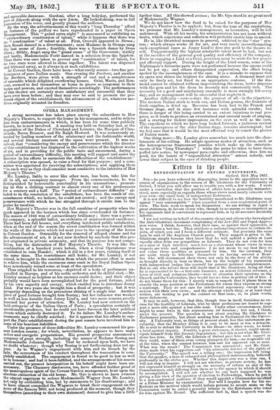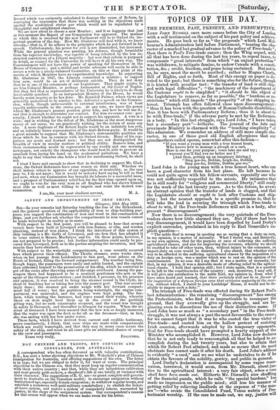Tettro to tht
REPRESENTATION OF OXFORD 'UNIVERSITY.
Word, 24th May 1862.
Sin—As you have referred in disparaging terms to the opposition now in course of organization to the return of Mr. Gladstone for the University of Oxford, I trust you will allow me to trouble you with a few words. I write under a conviction that the position of affairs here is generally misunder- stood, more especially as regards those whose views most nearly coincide with your own—the small body of independent Reformers. It is not difficult to see how the hostility manifested to Mr. Gladstone may appear "vary contemptible" when regarded from a non-academical point of view. The facts seem to speak for themselves : we are willing to reject a great statesman, in favour of one who, though by no means so incompetent as his opponents find it convenient to represent him, is by all amounts decidedly inferior.
I am not writing on behalf of the country clergy and others who have signed the Anti-Gladstone document complaining of the Jew-Bill and Papal-Aggres- sion votes. I think, however, that their ease, as against their opponents, is by no means a bad one. They attribute a national importance to certain ob- jects, of which you and I form a different estimate. But precisely the same may be said of the Anglican Church party. Their support is given to Mr. Gladstone simply because they know that he will uphold a policy at least equally alien from our sympathies as Liberals. They do not vote for him as a man of high intellect, much less as a statesman whose views in some respects are wide and comprehensive. I do not mean to say that they do not value these qualities as possessed by him. On the contrary, they are quite ready to felicitate themselves on having secured a Mem- ber who will recommend their views not only by the force of his ability as brought directly to bear on them, but by the weight of his reputation with independent judges like yourself for general political enlightenment. But no one who knows them will doubt that if Mr. Gladstone, being all that he is represented to be—a first-rate financier, an ardent Colonial reformer, a lover of civil and religious liberty—were to abandon their opinions on the Church and the Universities, they would lose no time in getting rid of him. I do not blame them for this: I merely wish to remark that it plaoes them in exactly the same position as the Protestants for whom they express so strong a contempt They do not care for intellectual supremacy except in con- nexion with their own views ; and the attempt which they, or at least their writers, are making to put the contest on that issue, is, in plain words, mere dishonesty. It may be said, however, that this, though true in itself, furnishes no ex- cuse for the hostility of Liberals who by their professions are bound to sup- port a more able against a less able man. Under other circumstances, there might be some fovea in this aryumentum ad homines ; but not, I think, under the present. The question is not about sending Mr. Gladstone to Parliament generally, but about sending him to Parliament for the Univer- sity. A University seat, as things at present stand, has this unfortunate pe- culiarity, that the Member filling it is sure to be more or lees a delegate. He is sent to defend the University in the House—in other words, lie holds a brief against inquiry. Possibly a great statesman, if elected, might mart-. cipate himself from this forensic degradation : but this is not what Mr. Glad- stone has done. In 1847, the Liberals of Oxford gave him such support as they could, genie of them even voting plumpers for ham,—no despicable aid at the time, when the contest between him awl his opponent ran so near. What was the result? The Commission was announced ; and Mr. Glad- stone made what his supporters call "his admirable defence of the rights of the University." The speech was a telling one ; the impression left being that the speaker, a man of enlarged and philosophical statesmanship, believed profoundly in the status quo. Whether this impr.esion was a .true one, I will not stop to inquire. I will not ask whether, in private society, he has not expressed himself as strongly on the necessity of reform as any of the Commissioners, only differing from them as to the agency by which it should be accomplished. I will not ask whether he can have supposed he was giving a fair view of the question of election to Fellowships, when he put it to a non-academical audience if they would appoint a Commander-in-chief or a Prime Minister by examination. Nor will I inquire how far his re- flections on the motives which would induce persons to accept seats on the Commission could be called a graceful tribute to the Reformers who voted for him against Mr. Round. The sufficient fact is, that a speech was de- livered which was eminently calculated to damage the cause of Reform, by conveying the impression that there was nothing in the objections made against the academical status quo which would not be repudiated by a thoughtful and enlightened observer. We are now about to choose a new Member ; and it so happens that just at this moment the Report of our Commission has appeared. The manner in which this is received by the new Parliament will be to Oxford the im- portant question of the day. How Mr. Gladstone will deal with it, we know already,—that is, if he adhere to the principles which he Fait forward in his speech. Unfortunately, his power for evil is not diminished, but increased. While the general question was pending, his defence, though formidable from his superior knowledge, was capable of being rebutted by the less in- structed convictions of a Liberal majority : but now that reform is purposed in detail, BB counsel for the University he will have it all his own way. The Commissioners will not have the power of speaking for themselves in the House of Commons ; and a skilful and fertile advocate will easily be able to secure a vote in a nicely-balanced Committee, on this or that point of the merits of which Members have no experimental knowledge. In supporting Mr. Gladstone in 1847, the Liberals committed a mistake; to support him now, would be an act of deliberate suicide. They do not deny that he is one of the ornaments of our Legislature. They might rejoice to see him Colonial Minister, or perhaps Ambassador at the Court of Naples. But they feel that as representative of the University he is likely to do them incalculable mischief. As an independent Member of the House, he would hardly resist inquiry as he has done. Mr. Roundell Palmer, whose views are generally understood to be similar to his, delivered a speech on the Commis- sion, which, though unfavourable to external interference, was at least equally unfavourable to the status quo. At any rate, we know the power which Mr. Gladstone's present position gives him, and how he will use it; and that is enough to determine our conduct. For him we cannot vote : per- sonally, I doubt whether we ought not to support his opponent. A vote is a wish ; and in wishing for the defeat of Mr. Gladstone as the most dangerous enemy of our cause, we are _practically wishing for the return of some one else. A mere duplicate of Sir Robert Inglis would be an infinitely less evil, and an infinitely fairer representative of the Anti-Reform party. It would be a great mistake to suppose that Mr. Gladstone's statesmanlike qualities are those which he has in common with his Oxford friends. Many of his sup- porters are acute and learned men; but they are not distinguished for breadth of view in secular matters or political ability. Remove him, and their statesmanship would be represented by one weekly and one morning newipaper, not exactly the champions who would best be able to prevent an assailant from laying his hand on the academical palladium. We have a right to say that whoever else holds a brief for unreforming Oxford, he shall not.
I trust I have said enough to show that in declining to support Mr. Glad- stone, the Oxford Reformers have some reason on their side. Whether we shall induce others to approve of our opposition, or neutrality, as the case may be, I do not know ; -but it would be indeed a hard saying to tell us that just now, when our Commission has brought its labours to a successful issue, and a prospect of Parliamentary relief has for the first time opened upon us, we ought to vote for the very man in all England who has shown himself most able as well as most willing to impede and resist the desired con- summation.
I am, Sir, your most obedient servant, M. A.



























 Previous page
Previous page